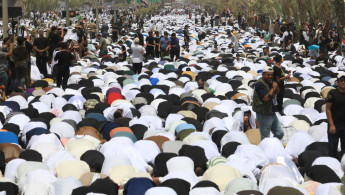Iraq Shia cleric Sadr's supporters attend mass prayer in Baghdad
Hundreds of thousands of Iraqi Shia cleric Muqtada Al-Sadr's followers thronged the streets of Baghdad on Friday, answering the populist leader's call to a mass prayer in a show of strength to his political rivals.
Sadr, whose party came first in a general election in October, has vowed to disband powerful Iraqi militia groups loyal to Shia Muslim Iran and to hold corrupt Iraqi politicians to account.
But the mercurial leader ordered all 74 of his lawmakers – around a quarter of the parliament – to resign last month after his attempts failed to form a government free of Iran-backed parties that have dominated many state institutions for years.
Divisions between Sadr and the Iran-aligned groups as well as Kurds vying for the post of Iraqi president have already forced the country into its second-longest period without an elected government.
The country is currently being run by the outgoing government of Prime Minister Mustafa Al-Kadhimi.
Iraqi officials, especially those close to Iran, fear Sadr will now use his large popular following of mainly working-class Shia Muslims to disrupt attempts to form a government, or to threaten to bring down future leaders with protests.
"We could be millions strong today," said Riyadh Husseini, 42, a manual labourer from the southern town of Hilla who travelled to Baghdad and slept on the street overnight in front of the podium where he hoped Sadr would appear.
"If Sadr calls for the removal of the corrupt parties in power, they'll be gone within the hour," Husseini said.
Loyalists from across southern and central Iraq attended the Friday prayer in stifling summer heat in Sadr City, the vast Baghdad district where millions of Sadr's followers live.
Sadr did not attend the prayer, despite rumours he would deliver a fiery address.
Instead, a representative reiterated Sadr's calls for the next government to disband militia groups loyal to Iran and punish corrupt politicians for squandering Iraq's vast oil wealth, which Iraqi officials and independent analysts view as directed at his arch rival former Prime Minister Nouri Al-Maliki.
"It's not possible to form a strong Iraqi government with unlawful militias. You must dissolve those all those factions," said the representative, Mahmoud Al-Jayashi, adding that "the first step to repentance is to punish the corrupt without delay".
The task of forming a government now falls to Sadr's Iran-aligned rivals and the country's Sunni and Kurdish parties.
One foot in power
Before withdrawing his lawmakers, Sadr had pushed for a coalition with Sunni and Kurdish allies to form what he called a national majority government – a euphemism for a government free of Iran-backed parties.
Iraq's parliament swore in dozens of new lawmakers on Thursday to replace a bloc loyal to the powerful Shia cleric Moqtada al-Sadr, strengthening the power of rival Iran-backed politicianshttps://t.co/cGmFBaCVNH
— The New Arab (@The_NewArab) June 23, 2022
Many Iraqis blame those groups for mismanaging the country since the 2003 US-led invasion that toppled Sunni dictator Saddam Hussein and catapulted Iraq's Shia majority to power.
Sadr distances himself from day-to-day politics and does not run for office, but has always kept one foot in power.
His politicians still control hundreds of powerful jobs across the government, including ministerial and civil servant posts.
On Friday, some of those who spent hours in the heat to see Sadr were disappointed he did not show up – several young men privately complained, but declined to give their names.
Others said they had faith that Sadr has a strategy.
"Sadr was here watching us. Loyalty is about answering his call," said Safaa Al-Baghdadi, a 42-year-old religious instructor who works in the southern holy city of Najaf.
"His message to the political establishment is to disband the militias who killed Iraqis," he said, referring to mass anti-government, anti-corruption protests in 2019 when police and militias shot hundreds of peaceful demonstrators.
"He's also telling Iraqis – if you rise up, I'll support you. We'll do whatever he says."
(Reuters)





 Follow the Middle East's top stories in English at The New Arab on Google News
Follow the Middle East's top stories in English at The New Arab on Google News


